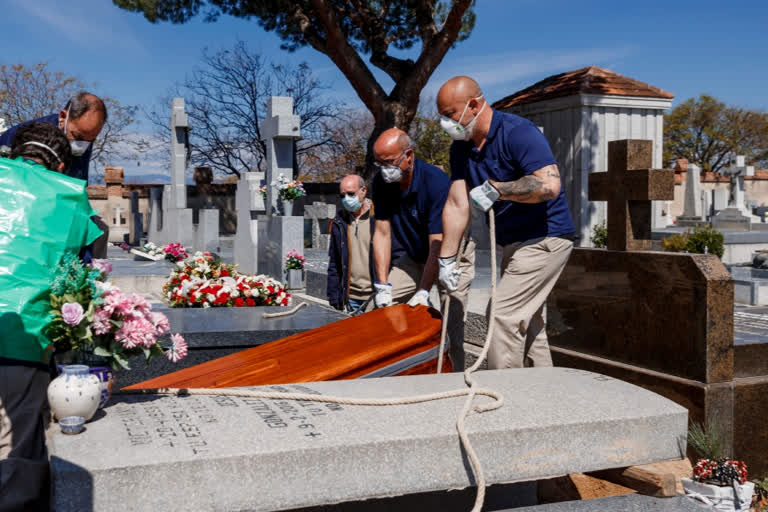New Delhi: As a kind of hush settles deeper across the expanse of India and thousands of towns and villages shut down to ward off a pandemic, life goes on as it must and so does death.
In times of social distancing, thousands of people are dying alone without a last glimpse of their loved ones who are unable to reach them. Mourning, too, is about isolation with no extended family, friends or even neighbours to share your grief in person.
In a dystopian present, imagined as a distant future only in fiction perhaps, the affluent and connected are mourning with each other through video conferencing and attending virtual funerals. Others, in villages and towns without easy access to technology, are left to grieve, alone with their thoughts and no one to help with the healing process.
Delhi-based journalist Ritika Jain, who lost her 85-year-old grandfather in Palitana, Gujarat, during the 21-day lockdown, which began on March 24 to curtail the spread of the coronavirus, couldn't get to meet him that one last time.
Her father managed to take the last flight from Mumbai to Bhavnagar just before the lockdown came into force but none of the others could. They attended the funeral through the Zoom mobile application.
"In the evening, the entire family met virtually through Zoom, paid last respects to my grandfather and consoled each other," Jain said as the number of COVID-19 cases crossed 1,900 with 50 fatalities.
Actor Sanjay Suri did the same when his wife lost her grandmother. It was so strange attending a funeral via Zoom. Strange times! he wrote on Twitter.
With governments limiting the number of people who can attend a funeral to 20 or less, no way to travel from one city to another and passes needed to leave the house, deaths have become complicated beyond belief. And the emotional trauma is just one of the many things to deal with.
Also read:COVID-19 cloud over big-ticket Durga Pujas in West Bengal
When 77-year old Kesavan, who lives in a Chennai suburb, heard the news of the death of his 94-year old mother at his sibling's home in a distant corner of the city, his first thought was the commute.
Finally, he told reporters, he just left home without waiting for the pass.
"The spectre of coronavirus is horrible as it punishes even those who are not affected", added K Veeraraghavan, also from Chennai, who lost his father recently. No members of the family could join the cremation.
Funerals have always been a time for social bonding in Indian society. But not any more with crematoriums and burial grounds strictly limiting the number of people allowed.
According to Rakesh Kapoor, caretaker of the Shamshan Ghat (Mukti Dham) in Punjab's Ludhiana town, the number of people at a cremation have come down sharply from 100 to just 20.
As soon as the body arrives, we allow people to pay their last respects for just one or two minutes and then start the process of performing last rites, he said.
In Haryana, too, rules are being strictly followed.
Sukhbir Singh, from Gorakhpur village in the state, lost his uncle to cancer recently and said the family followed all the regulations.
But it all came at an emotional cost.
"The kind of support one gets from friends, neighbours and relatives is not there these days due to the restrictions," he said.
For many families, the lockdown has also meant coming to terms with the fact that everything cannot go as they had always planned.
In Odisha, for instance, many Hindus believe that those cremated in Swargadhar in Puri will get moksha.
On normal days, about 60 bodies are cremated at Swargadwar each day, said Bjay Kumar Das of the Puri Municipality. But this has come down to less than 10.
B Dhai, from Banki village in Cuttack, went to Swargadhar for his mother's last rites in accordance with her last wishes and a handful of family members accompanied the hearse to the seaside town.
However, the post-death rituals have been done away with.
Church leaders are being equally strict.
